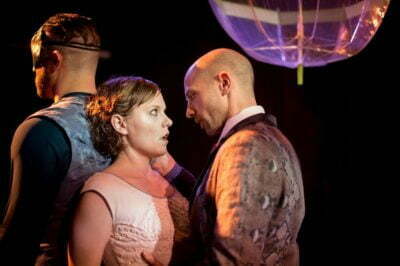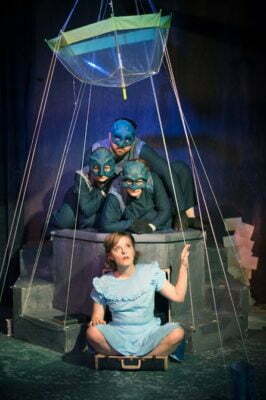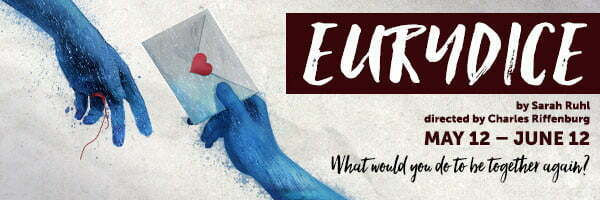Eurydice
By Sarah Ruhl
Directed by Charles Riffenburg
Produced by BoHo Theatre
At Heartland Studio, Chicago
“We are a chorus of stones!”
The River of Lethe Runs Through It
Sarah Ruhl is one in a line of many artists — from Claudio Monteverdi, to Jean Cocteau, to musicians such as Nick Cave — who have adapted the myth of Orpheus and Eurydice to their own vision. What makes Ruhl’s re-imagining unique is that she departs from the myth’s typical focus — that of the musician-poet Orpheus and his pilgrimage into Hades to rescue his dead wife — and instead centers the drama primarily on Eurydice and her relationship to her dead father. This allows Ruhl to weave in other themes besides death and intimate love, such as language and the bond of filial affection. Indeed, taking much of her material from her own experience of the loss of her father, Ruhl layers Eurydice as a kind of coming-of-age quest of a woman pulled three ways: toward the adoring and sheltering love of her father; the passionate and dreamy love of her husband; and the nasty but interesting love of her strange, male admirer.

If you are unfamiliar with the original myth, all you really need to know is that Eurydice, Orpheus’ wife, dies, and that Orpheus, moved by his love (or ego), decides to descend into the Underworld armed with nothing but his music in order to bring her back. Hades, the ruler of the Underworld, agrees to let her go so long as Orpheus doesn’t gaze upon her until after she has re-entered the world of the living. In the end, Orpheus is nearly successful. Ruhl’s Eurydice sticks with this basic premise but adds a lot.
Ruhl’s sweet but somewhat naïve Eurydice (Amanda Jane Long) finds herself bored at her own wedding reception, where not an interesting person can be found in the absence of her Orpheus (Chloe Dzielak), her artistically absorbed husband who has locked himself in the shower in order to escape having to greet guests (he’s a real artist). A Nasty Interesting Man (Adam Kander) does happen to find Eurydice, but his creepy yet alluring charm ultimately leads her to her death when, after luring her to his fancy, high-rise apartment with the bait of a letter from her deceased father (Peter Robel), he attempts to court her. Eurydice escapes with her father’s letter only to fall down his stairwell straight to the Underworld.

In the realm of the dead, Eurydice is cast into a pre-adolescent state-of-mind and loses her memories and her ability to understand human tongues. At first, her only company is a Chorus of Stones (Eleanor Katz; Adam Thatcher; Taryn Wood) who are resigned to their passionless existence and who will nothing now but the adherence to the rules of the dead (e.g. crying is not allowed!). Yet, though she cannot identify him, Eurydice’s father soon finds her and begins to care for her as only a father might: by building her a room of string and reminding her of her memories and her human language.
As Eurydice continues to learn and grow reattached to her father, Orpheus (Chloe Dzielak) continues to write Eurydice letters and songs as he plans a way to save her from death. By the time Orpheus successfully reaches the Underworld, Eurydice has again found another competing suitor in the unruly child known as The Lord of the Underworld (Adam Kander). Now she must choose between either a life with her husband or an eternal death with her father (complete with a hellacious marriage to The Lord of the Underworld).
Eurydice’s answer, presumably, is the one with the best (or “most interesting”) “argument,” but the only tragedy in this retelling is how Ruhl’s penchant for whimsically poetic and colorful dialogue renders the story emotionally inert, in much the same way as some poets endeavor to be poetic but grasp only the form without the substance. Her whimsy is also felt in the presentation of many of her original themes; for instance, Ruhl’s preoccupation with language and the filial bond between father and daughter (wo themes that are closely tied here) fail to add any meaningful substance to the story and fall short of any nuanced observation of either. Ruhl herself has stated that the play was written in her father’s honor and in order to “have a few more conversations with him,” and that is exactly how those portions feel: like playful and sentimental tangents of personal significance.
Though I find Ruhl’s writing in Eurydice to be overly cutesy, affectedly poetic and, by consequence, emotionally contrived, I can imagine a production that would be able to ground her language in a poignant narrative. Unfortunately, BoHo’s production is not such a production. Ruhl’s stage directions give great liberty to Eurydice’s staging, and, so far as the more technical aspects are concerned, BoHo succeeds in fulfilling Ruhl’s creative world. The scenic design by Michael Lewis does a lot within a minimalist scope to create an otherworldly atmosphere in which a cold, industrial landscape is colored with the evocative touch of lost love letters; and the imaginative choreography, designed by Melissa McNamara, complements this minimalist design by having the actors’ graceful movements capture what a set simply cannot, such as Eurydice’s fall in the Underworld.
Excepting those elements, however, Charles Riffenburg’s directorial vision indulges too much in Ruhl’s playful poeticism and schmaltz to really ground the story in an emotionally affecting way. In spite of his wise efforts to stage the play intimately by having the action take place in the midst of the audience, his actors’ performances are anything but subtle and intimate. Long and Dzielak, as Eurydice and Orpheus, indicate all the common, symptomatic signs of love — from doe eyes, to hand clasping — but never submit themselves to those emotions long enough for us to believe them. On the other hand, Robel, as Eurydice’s father, fully embraces his character’s role, but does so as an ambling cliché of 1990s fatherhood (a la Full House); so, apart from his artistically redemptive closing monologue, he too is unbelievable. Contrarily, Kander, who plays both the Man and the Lord, captures perfectly the seething perversity and neuroticism of his characters; on that account, though the nefarious villains, his characters are by far the most likeable because of their lived-in truthfulness.
Not Recommended
August Lysy
Playing at the Heartland Studio, 7016 N. Glenwood Ave., Chicago. Tickets are $25. For tickets and information, call 866.811.4111, or visit BoHoTheatre.com. Performances are Thursdays, Fridays, and Saturdays at 8 p.m., and Sundays at 2 p.m. through June 12 (with a special industry performance on Monday, May 30 at 8 p.m.). Running time is 95 minutes with no intermission.

